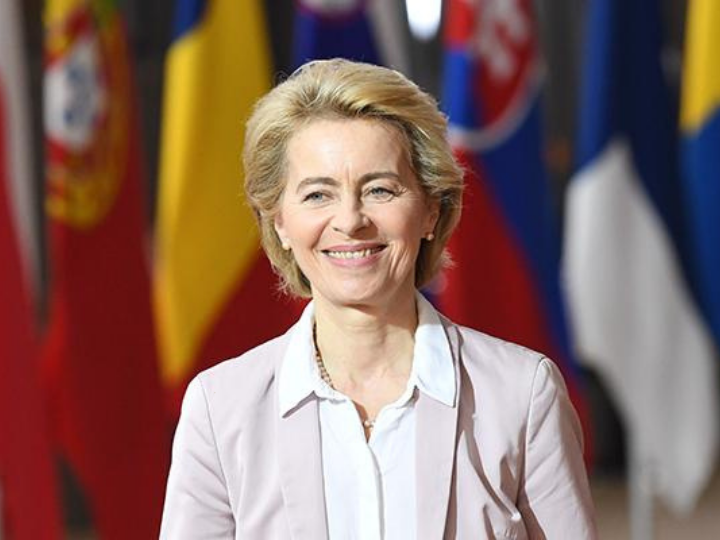by Max Griera
European liberal forces will be warming up for an electoral battle against Commission President Ursula von der Leyen when they meet on Wednesday (20 March) to launch their joint “Renew Europe Now” electoral campaign platform amid poor performance at the polls.
The liberal Renew Europe group in the European Parliament could lose around 15 seats, entering a neck-to-neck race with national-conservative ECR and far-right ID groups for fourth or fifth place.
With such prospects, having been kingmakers in the last legislature by allying with both the left and right sides of the hemicycle, their influence is at risk as right-wing forces grow.
As June’s European election looms, they find themselves rallying behind a common enemy- that of Commission President Ursula von der Leyen, who is running for a second term at the helm of the EU executive.
“Less von der Leyen, more freedom. That must be the message in the coming months,” Marie-Agnes Strack-Zimmermann, the lead candidate of the biggest liberal European party, ALDE, said at a national congress in late January.
Despite their messaging, the liberals will be vital in forming a centrist majority alongside the European People’s Party (EPP) and the social-democrats (S&D), especially as their votes are needed to reelect current Commission President Ursula von der Leyen.
Even though national parties have divergent priorities, making it difficult for von der Leyen to cater to everyone, two key demands will be to pause further green regulation to boost Europe’s industry competitiveness and to sideline the far-right.
Against the “bureaucratic madness”
The different liberal factions’ joint electoral programme under Renew Europe, seen by Euractiv, pledges a regulatory pause on Green policy to focus on implementing the existing laws passed in the last term: “Otherwise, our businesses and citizens won’t be able to keep up,” the draft reads.
Despite such a goal aligning with what the EPP and von der Leyen are proposing too, some liberal factions are wary of her true intentions for the next term, pointing at her work at the helm of the Commission for the last five years.
The German liberal FDP, for example, will make the fight against von der Leyen one of the main focal points in their election campaign and attack her for her “bureaucratic madness.”
They are also trying to discredit von der Leyen’s conservative profile, stating that she was a Green politician in disguise, the party’s general secretary Bijan Djir-Sarai said at the party congress.
Similarly to FDP, Czech liberal party ANO is casting doubt over von der Leyen, demanding her to backtrack on key Green Deal files to “restore Europe’s competitiveness,” Ondrej Knotek, Czech MEP from ANO, told Euractiv.
ANO, a member of ALDE, could also be key for von der Leyen’s reelection as they are projected to have 12 seats.
Knotek added that the next Commission president “must commit to pushing through changes to a whole series of nonsensical measures (…) in particular the ban on internal combustion engines.”
This demand contradicts other liberals, such as Renew President Valerie Hayer, who told Euractiv she opposes revising Green files.
The liberal party Italia Viva and its leader Matteo Renzi, former Italian Prime Minister, have also announced they will campaign against von der Leyen.
“It is on the Green Deal that we see the real failure of Ursula von der Leyen (…) If I am elected to the European Parliament, I will propose to vote against her and to identify a leader and not a follower of ideology,” Renzi said at a rally in Florence earlier this month.
He argued she is unreliable because she first went too far with Green regulation, only to backtrack later following farmers’ protests and the industry’s negative backlash.
Romania’s liberal USR, projected to score four seats, also confirmed they will not back up von der Leyen, arguing that the Commission has overlooked democratic backsliding in Romania due to political pressure by the socialists and centre-right.
Moreover, the ALDE draft manifesto strongly criticises the ‘EPP-led’ Commission for neglecting single market harmonisation, undermining the EU’s competitiveness.
Playing with the far-right backfires too
Aside from her flagship policies at the helm of the European Commission, von der Leyen’s recent rapprochement with far-right and conservative forces sets the liberals against her.
Von der Leyen recently expressed her willingness to collaborate with political forces from the national-conservative ECR group in the European Parliament.
However, Hayer is expected to oppose any type of collaboration with ECR forces.
Similarly, Sandro Gozi, leader of the European Democratic Party and one of the three EU liberals’ lead candidates, expressed criticism over von der Leyen’s statements:
“Ursula von der Leyen has been ambiguous about the extreme right, we Eurodems do not make political alliances with ECR. She seems to be chasing Meloni (…) we are somewhere else,” he told Euractiv.
*first published in:Euractiv.com




 By: N. Peter Kramer
By: N. Peter Kramer

